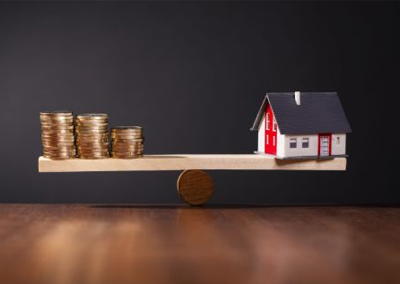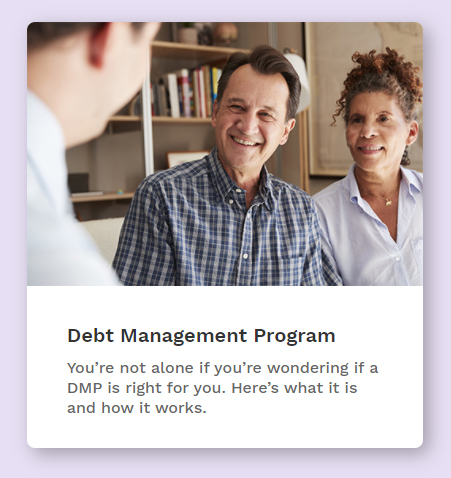How to Decide If Downsizing Your Home When You’re in Debt Is Worth It
By Julie Jaggernath
If you’re thinking about downsizing, crunch your numbers carefully because it might cost you more than it saves in the long run. Over 750,000 Canadians applied for mortgage deferrals since the start of the COVID-19 pandemic. Depending on your situation, you might be thinking about taking it one step further – cutting ties with a big mortgage for one that’s more affordable. There are a few ways to do this, like moving to a less expensive city or cashing out savings to pay off a mortgage, but the option many turn to first is downsizing their home.
Here are some things to consider as you decide if downsizing is a way to pull yourself out of debt, or if you’re better off looking at other options first.
Low Interest Rates Make Debt Seem Normal
The low interest rates of the past 20 years have made many Canadians think that it’s normal to have debt. A lot of households rely on credit to pay for everything from groceries to vacations. Credit cards, vehicle and personal loans, mortgages, and lines of credit are all used, often without a second thought. However, if we view having debt as normal, we risk falling into a trap that’s hard to escape from.
What we spend our money on has shifted during the pandemic, but credit use has almost returned to pre-pandemic levels. This has made economists predict that after the health crisis, we’ll have an economic crisis, which will almost surely be followed by an insolvency crisis as people grapple with how to regain control of their finances. Interest rates are expected to remain low as Canadians and our economy fight to regain financial stability. This can be a great opportunity to pay off debt before interest rates rise to more normal levels again. You might, however, face some difficult decisions along the way to balance your budget. If this is your situation, reach out to us sooner than later for help getting back on track.
The Most Effective Ways to Pay Off Debt

Avoid Spending Too Much on Housing-Related Costs
When we put too much of our income into a specific type of expense, we can end up with a budget that’s too tight for our lifestyle. Spending too much on housing-related costs traps many people into a cycle of relying on credit to make ends meet.
When we spend too much on housing costs it makes us “house poor.” This means that our mortgage or rent and other bills tied to home ownership — like utilities and property taxes — leaves us without enough money for the rest of our monthly costs. If we reach for our credit cards to cover the shortfall, our debt will only grow. But whether we should or shouldn’t downsize to free up cash and get out of debt isn’t always a straightforward answer.
What Does It Cost to Downsize?
Moving, whether you’re downsizing or not, isn’t cheap. You need to sell your current house, find a new one, pack, unpack, and make yourself comfortable in your digs. You might plan to take your furniture and even some appliances with you but discover that that they don’t fit, so you need to buy new ones. Moving comes with as many expenses as it does work, making it a better long-term strategy than short-term fix.
Taxes and Fees
When you’re buying, you’re on the hook for what can feel like an endless amount of expenses. It’s good to budget about 5% of your purchase price, in addition to your down payment, for all of these costs. They can come to thousands of dollars, depending on which province you’re in.
Just to get the deal done, these expenses include:
- Closing costs
- Legal fees
- Land transfer taxes
- Real estate fees
- GST on fees
If you end up buying a brand new home, GST/HST is generally due at completion. While there are some rebates available, you typically claim them afterwards, so you do have to pay the full cost upfront.
Provincial sales tax in some provinces is another expense, and it cannot be added to the mortgage principle.
Down Payment and Mortgage Loan Insurance
If you don’t have a 20% down payment available, either from savings or equity in your current home, you must pay mortgage loan insurance. This expense depends on your mortgage amount: for example, a 10% down payment would add a fee of 3.10% onto your mortgage amount.
Closing Costs
When selling your home, you need to cover real estate fees. These typically run between 2% – 6% of your sale price. Even if you use a low commission real estate firm, the realtor bringing in the buyer will still expect their full commission.
Identify any repairs that need to be made to your home and if appliances need updating. Staging costs and landscaping for curb appeal are additional selling costs, where home inspections, appraisals, and surveys can be buying as well as selling expenses.
Mortgage Costs Between Renewal Dates
Mortgages come with a very big list of terms and conditions. Ask your lender which rules apply to your specific situation before you start shopping for a less expensive home. If you’re in the middle of your mortgage term, you’ll face an interest penalty if you port over a smaller mortgage than you have right now. How big your interest penalty will be depends on the interest rate you’re paying vs. current rates.
If your mortgage is up for renewal very soon, it can make sense to renew into an open mortgage with lots of flexibility so that you’ve got time to make your decision.
Hidden Costs
Come moving time you’ll have to stock up on boxes, packing tape, and other moving supplies. You’ll need to book time off of work, perhaps hire painters and other contractors to freshen up your old home before selling or your new home upon moving in. And don’t forget the movers, cleaners, deposits to hook up utilities, as well as mail forwarding and fees for new identification. You might even need to spring for pizza and beer if you’ve roped your family and friends into helping.
6 Things No One Tells You When Buying a House
Are Your Housing Expenses the Real Problem?
Downsizing can save you money, but there’s no guarantee that it will get you out of debt. Before making the decision to move into a smaller home, figure out what’s really causing your financial problems by asking yourself these questions:
- Are certain expenses keeping me in debt?
- Is my income stable?
- Can I reduce my bills by at least 10%?
- Is everyone in my household doing their part to earn money and/or bring spending under control?
- Are my debt troubles a one-time incident or long-term problem?
Use a budgeting spreadsheet to juggle the numbers and see how you could balance your budget. Start with fixed expenses such as your mortgage, utilities, insurance, property taxes, medical expenses, and base transportation costs. It can help to pull out pre-pandemic statements to get more accurate numbers.
Then look at expenses where you have more discretion over how much you spend, such as groceries, personal care, eating out, gifts, vacations, shopping, entertainment and recreation. More often than not, this is the part of your budget that’s got the most room for change.
If you’re not sure what each member of your house is spending, track your household spending to gain insights into everyone’s habits and to see where your money is actually going.
What a Detailed Look at Your Budget Can Reveal
By conducting an in-depth and thorough review of your spending, you might discover that you could afford the cost of running your home by cutting costs on other expenses. Maybe it’s your fondness for grabbing takeout, buying trendy clothes, shopping online when you’re bored, or giving in to every whim of your kids that’s causing your debt. Finding ways to reduce your discretionary expenses – even temporarily – can help you get through a difficult time.
Are Your Debt Problems Pandemic-Related or Life-Related?
As you consider your options, ask yourself if what you’re dealing with right now is a one-time situation due to these unprecedented times or whether your debt trouble has been brewing for a number of years.
Maybe you had a large expense a few years ago that you never really recovered from. Have you got teens or young adults who could be doing a little more to pull their own weight? Working even part-time could take some of their expenses off your plate and help them build valuable money skills.
Be conscious of crunching all of your numbers, not just the first ones that come to mind. It might be that rather than downsizing, you simply need to create a frugal spending plan that will pull you through these financially challenging times.
What Would Your Financial Throwback Reveal?
If You’re Not Saving Big, Downsizing Might Not Be Worth It
After all of the expenses are accounted for, chances are you’ll need to downsize significantly to reap any financial benefits. As you explore options to manage your debt and keep your family healthy during the pandemic, know that there’s plenty of help available. Take advantage of support programs if you need to stabilize your income situation. From industry professionals to non-profit credit counselling organizations like us, there’s free assistance available to help you determine whether or not it’s in your best interest to keep your current home or downsize. Reach out to us by toll-free phone at 1-888-527-8999, anonymous online chat, or even by email. We’re happy to answer your questions and give you an unbiased opinion about your situation so that you can decide what will work best for you and your family in the long run.
Last Updated on October 30, 2024






